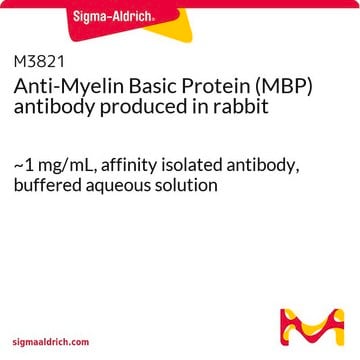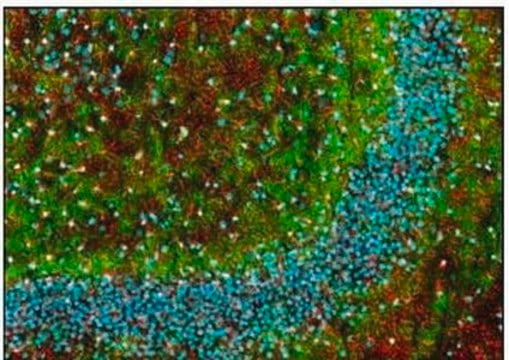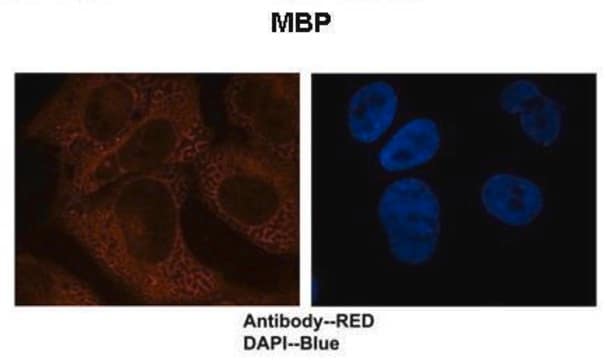MAB386
Anti-Myelin Basic Protein Antibody
CHEMICON®, rat monoclonal, 12
Synonym(s):
MBP
About This Item
Recommended Products
product name
Anti-Myelin Basic Protein Antibody, a.a. 82-87, culture supernatant, clone 12, Chemicon®
biological source
rat
Quality Level
antibody form
culture supernatant
antibody product type
primary antibodies
clone
12, monoclonal
species reactivity
human, rat, sheep, mouse, rabbit, chicken, guinea pig, bovine, all
manufacturer/tradename
Chemicon®
technique(s)
ELISA: suitable
immunocytochemistry: suitable
immunohistochemistry: suitable
radioimmunoassay: suitable
western blot: suitable
isotype
IgG2a
NCBI accession no.
UniProt accession no.
shipped in
dry ice
target post-translational modification
unmodified
Gene Information
human ... MBP(4155)
mouse ... Mbp(17196)
rat ... Mbp(24547)
General description
Specificity
Immunogen
Application
A previous lot of this antibody was used on frozen sections.
ELISA/RIA:
1:1000 dilution of a previous lot of this antibody was used in ELISA/RIA.
Western Blotting:
Identifies an 18-20kDa band in westerns.
Optimal working dilutions must be determined by end user.
Neuroscience
Neuronal & Glial Markers
Neurochemistry & Neurotrophins
Quality
Western Blot Analysis:
1:500 dilution of antibody lot detected four isoforms of MBP on 10 µg of Mouse brain lysates.
Target description
Physical form
Storage and Stability
Analysis Note
Brain tissue
Other Notes
Legal Information
Disclaimer
Not finding the right product?
Try our Product Selector Tool.
recommended
Storage Class Code
12 - Non Combustible Liquids
WGK
nwg
Flash Point(F)
Not applicable
Flash Point(C)
Not applicable
Certificates of Analysis (COA)
Search for Certificates of Analysis (COA) by entering the products Lot/Batch Number. Lot and Batch Numbers can be found on a product’s label following the words ‘Lot’ or ‘Batch’.
Already Own This Product?
Find documentation for the products that you have recently purchased in the Document Library.
Customers Also Viewed
Our team of scientists has experience in all areas of research including Life Science, Material Science, Chemical Synthesis, Chromatography, Analytical and many others.
Contact Technical Service









